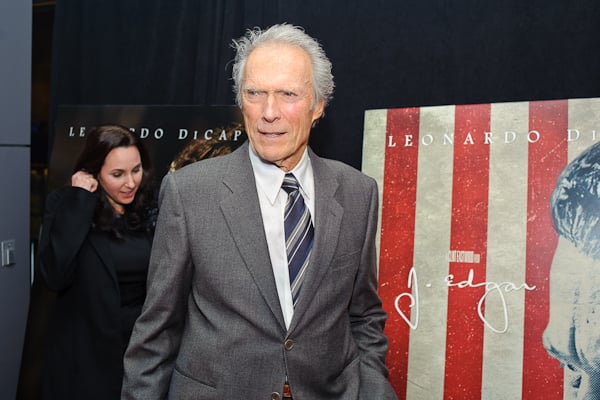J. Edgar director Clint Eastwood attended the film’s DC premiere at the Newseum last night. Photographs by Kyle Gustafson
If J. Edgar Hoover were alive today, Clint Eastwood would have wiretaps on his phones and G-men stationed outside his house, and the Department of Homeland Security would be asking for his long-form birth certificate to confirm he’s really an “American” icon. It’s not that Eastwood’s J. Edgar is particularly irreverent—in fact, it’s staid and stodgy practically to the point of atrophy. It’s just that Hoover didn’t take kindly to anyone prying into his own character and generally responded with an all-out character assault of his own. Eastwood puts on display a Hoover (given wild-eyed life by Leonardo DiCaprio) consumed by paranoia and never shy about using every resource available to him in his Federal Bureau of Investigation to take down his enemies.
That ought to make for thrilling cinema: watching one of the most powerful and secretive men of the 20th century expertly manipulate Washington to his own ends and build the FBI from the ground up into a feared entity to enforce his iron-fisted ideas of justice, law, and order. Screenwriter Dustin Lance Black (who also wrote Gus Van Sant’s Milk) provides Eastwood with a script that has the core of a fascinating approach to Hoover’s life. Hoover was as skilled at PR, propaganda, and image control as he was at changing the face of law enforcement, so Black frames the story as Hoover’s version of events, unreliably narrated near the end of his life to a series of young, attractive, male FBI employees assisting him with writing his memoirs.
But the film’s first major stumble is revealing at the very start that Hoover’s version of events is not to be trusted. Near the end, Eastwood attempts a big reveal, as a close confidant of Hoover reads the manuscript and details every instance it strays from the truth. But the scene lacks any impact because Eastwood and Black have already showed their hand.
More problematic is the tasteful lifelessness and overwrought melodrama that has unfortunately come to typify too much of Eastwood’s filmmaking over the last decade. There’s no denying the efficient professionalism at work here, but he’s been at this so long and is so facile as a director that it seems he’s forgotten the urgency necessary to drive a drama forward. The result is as drab as the muted browns of the film’s color palette, and, at well over two hours, it’s a dreary slog through 40 years of history that were nowhere near as dull as what’s onscreen here.
There are occasional gems to be found, such as in the police procedural surrounding Hoover’s remembrances of the Lindbergh baby kidnapping (the case that was his bureau’s coming out), which has a gratifying true-crime feel. The most compelling part of the film, though, is DiCaprio’s intense performance. His Hoover is a powder keg of bottled emotion and repression, stemming, it’s suggested, largely from homosexual urges the film is not at all shy about addressing, particularly in regard to Hoover’s complicated relationship with longtime lieutenant and companion Clyde Tolson (Armie Hammer). At the root of that repression is Hoover’s mother, played here with puritanical fervor by Judi Dench. At one point Mrs. Hoover tells her son—whom she sees more clearly than he sees himself—that she’d rather have a dead son than a “daffodil.”
There’s a much more satisfying movie buried in J. Edgar, deeply concealed like the secret files Hoover kept on his enemies—which he promptly had destroyed by his longtime secretary, Helen Gandy (Naomi Watts), upon his death. All the ingredients are here: Hoover’s confused and checkered private life, his blackmail of presidents, his attempts to discredit Martin Luther King and portray him as a dangerous radical. Yet with a wealth of hugely provocative material, Eastwood provokes little more than yawns.
J. Edgar, directed by Clint Eastwood, written by Dustin Lance Black. Starring Leonardo DiCaprio, Naomi Watts, Armie Hammer, Judi Dench. Opens today at the AMC Georgetown, expands Friday to theaters across the area.
Watch the trailer here.















